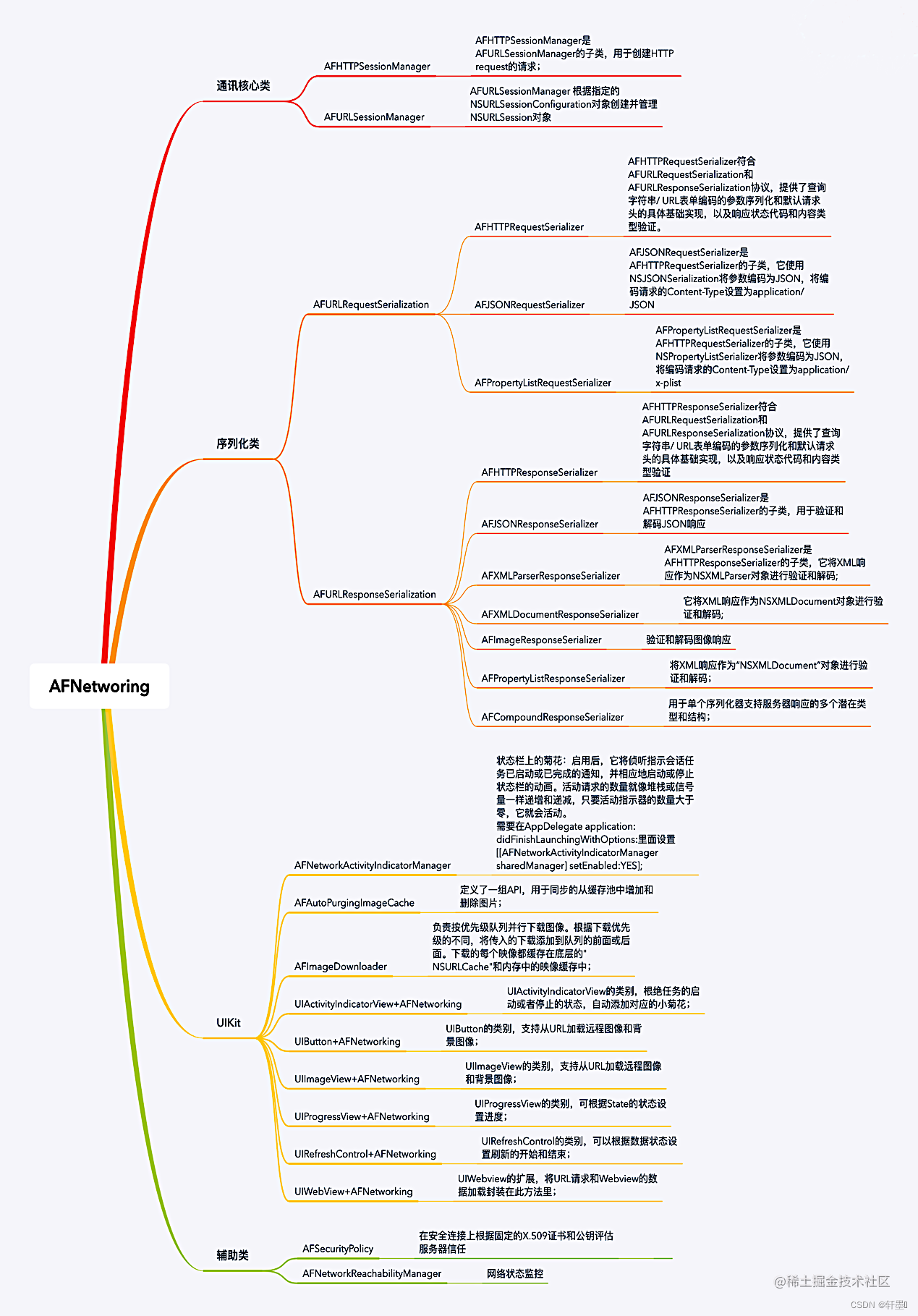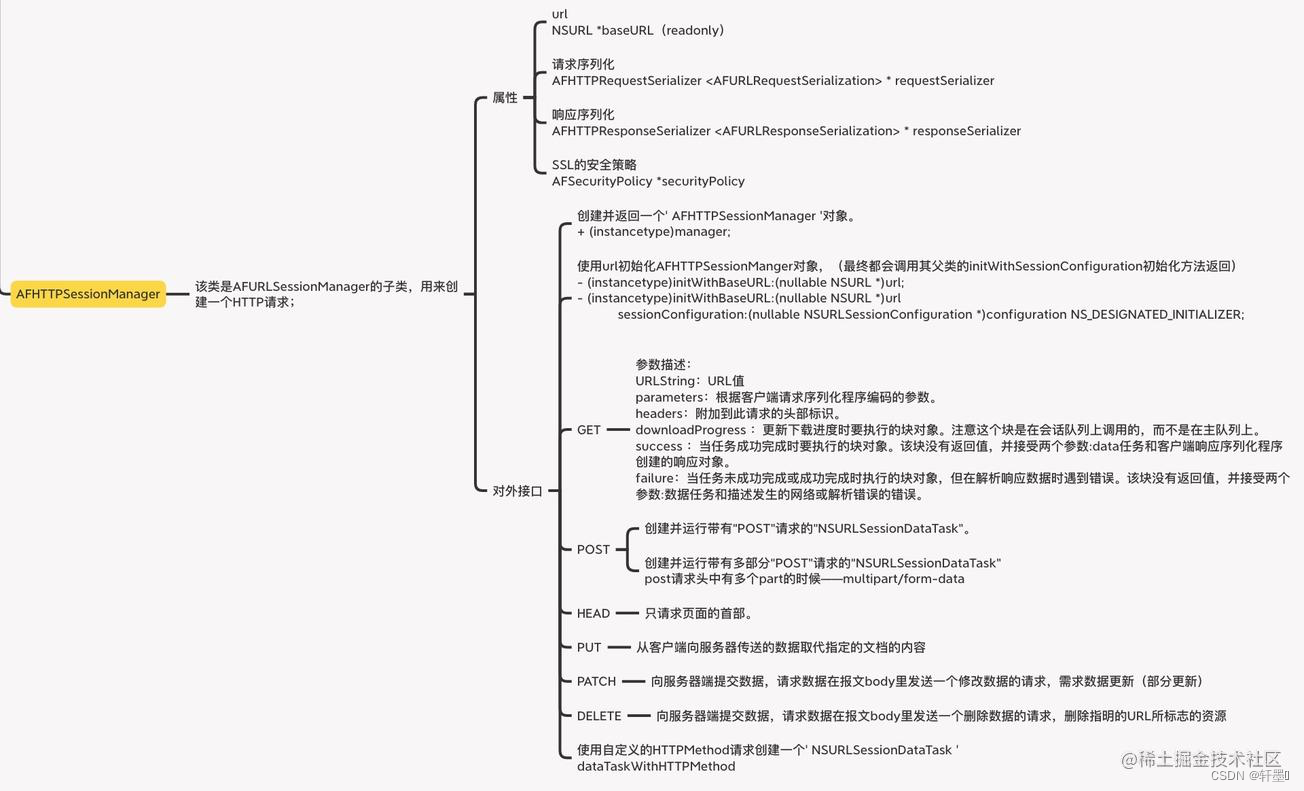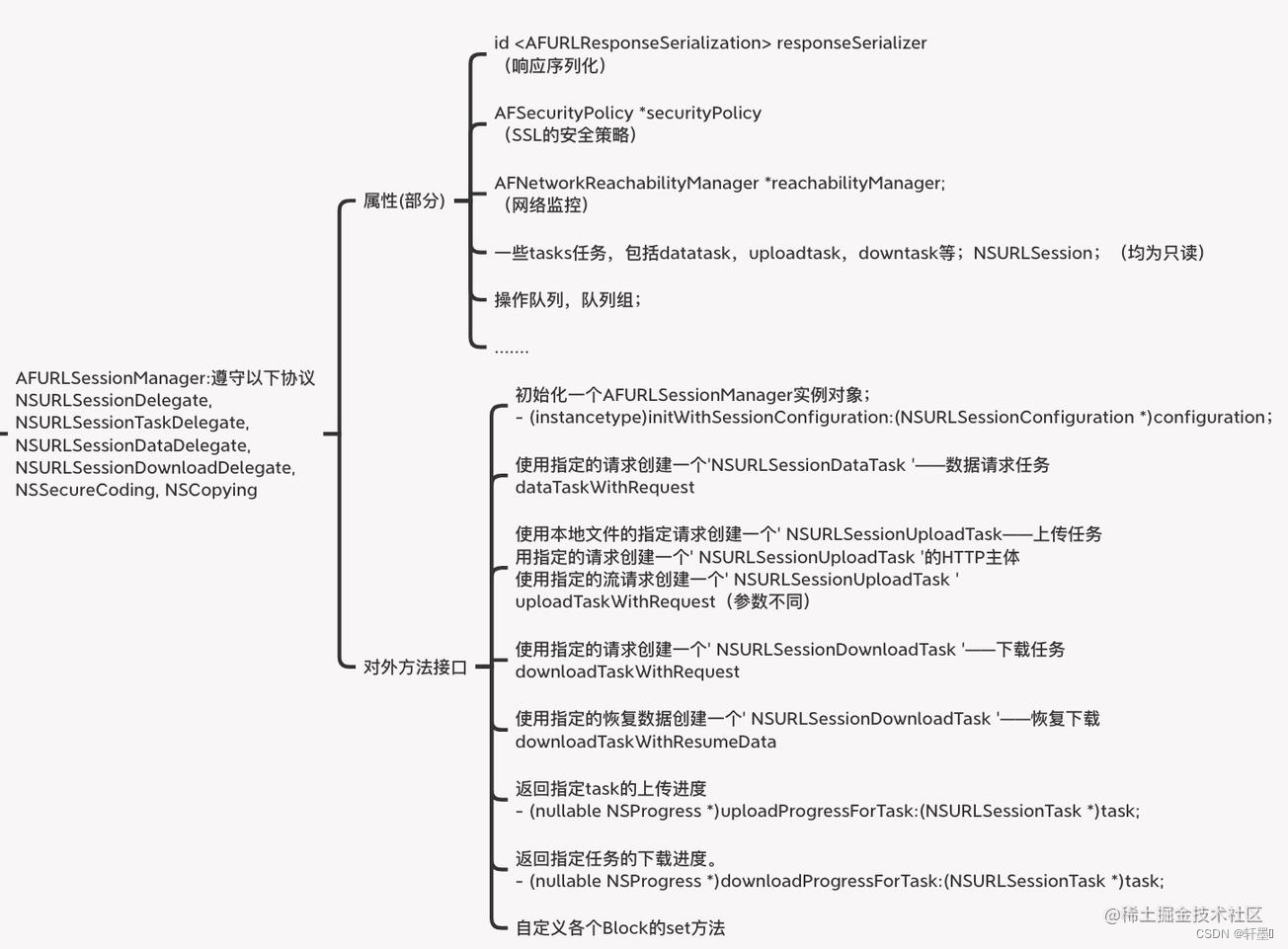文章目录
简介
AFNetworking是适用于iOS,macOS,watchOS和tvOS的的网络库。它构建于Foundation URL系统之上,扩展了Cocoa内置的强大的高级网络抽象。它采用模块化架构,设计精良,功能丰富的API,使用起来非常简单。
组织架构图

通讯核心类
AFHTTPSessionManager
简介
AFHTTPSessionManager本身是对网络请求做了一些简单的封装,请求的整个逻辑是分发给AFURLSessionManager或者其他类去做的;其内部管理自己的两种序列化工具,用来对请求和响应的数据做序列化;同时依赖于父类提供的保证安全,监控网络状态,实现发出HTTP请求的核心功能;
属性和接口

模块一:创建AFHTTPSessionManager对象
在这里的manager创建AFHTTPSessionManager对象,不是单例。
+ (instancetype)manager {
return [[[self class] alloc] initWithBaseURL:nil];
}
模块二:初始化该对象
//使用指定的URL初始化对象
- (instancetype)init {
return [self initWithBaseURL:nil];
}
- (instancetype)initWithBaseURL:(NSURL *)url {
return [self initWithBaseURL:url sessionConfiguration:nil];
}
- (instancetype)initWithSessionConfiguration:(NSURLSessionConfiguration *)configuration {
return [self initWithBaseURL:nil sessionConfiguration:configuration];
}
- (instancetype)initWithBaseURL:(NSURL *)url
sessionConfiguration:(NSURLSessionConfiguration *)configuration
{
self = [super initWithSessionConfiguration:configuration];
if (!self) {
return nil;
}
// 确保baseURL路径的终端斜杠,以便NSURL+URLWithString:relativeToURL:按预期工作
if ([[url path] length] > 0 && ![[url absoluteString] hasSuffix:@"/"]) {
url = [url URLByAppendingPathComponent:@""];
}
self.baseURL = url;
// 默认HTTP请求序列化器和JSON响应序列化器
self.requestSerializer = [AFHTTPRequestSerializer serializer];
self.responseSerializer = [AFJSONResponseSerializer serializer];
return self;
}
模块三:
- (void)setRequestSerializer:(AFHTTPRequestSerializer <AFURLRequestSerialization> *)requestSerializer {
NSParameterAssert(requestSerializer);
_requestSerializer = requestSerializer;
}
- (void)setResponseSerializer:(AFHTTPResponseSerializer <AFURLResponseSerialization> *)responseSerializer {
NSParameterAssert(responseSerializer);
[super setResponseSerializer:responseSerializer];
}
模块四:网络请求
大部分网络请求都是生成一个dataTask任务,调用resume开启请求。
有7种方式。
- HEAD网络请求
- (NSURLSessionDataTask *)HEAD:(NSString *)URLString
parameters:(nullable id)parameters
headers:(nullable NSDictionary<NSString *,NSString *> *)headers
success:(nullable void (^)(NSURLSessionDataTask * _Nonnull))success
failure:(nullable void (^)(NSURLSessionDataTask * _Nullable, NSError * _Nonnull))failure
{
NSURLSessionDataTask *dataTask = [self dataTaskWithHTTPMethod:@"HEAD" URLString:URLString parameters:parameters headers:headers uploadProgress:nil downloadProgress:nil success:^(NSURLSessionDataTask *task, __unused id responseObject) {
if (success) {
success(task);
}
} failure:failure];
[dataTask resume];
return dataTask;
}
- GET网络请求
- (NSURLSessionDataTask *)GET:(NSString *)URLString
parameters:(nullable id)parameters
headers:(nullable NSDictionary <NSString *, NSString *> *)headers
progress:(nullable void (^)(NSProgress * _Nonnull))downloadProgress
success:(nullable void (^)(NSURLSessionDataTask * _Nonnull, id _Nullable))success
failure:(nullable void (^)(NSURLSessionDataTask * _Nullable, NSError * _Nonnull))failure
{
NSURLSessionDataTask *dataTask = [self dataTaskWithHTTPMethod:@"GET"
URLString:URLString
parameters:parameters
headers:headers
uploadProgress:nil
downloadProgress:downloadProgress
success:success
failure:failure];
[dataTask resume];
return dataTask;
}
- POST网络请求
在POST网络请求中,有两种实现方式:
- (nullable NSURLSessionDataTask *)POST:(NSString *)URLString
parameters:(nullable id)parameters
headers:(nullable NSDictionary <NSString *, NSString *> *)headers
progress:(nullable void (^)(NSProgress *uploadProgress))uploadProgress
success:(nullable void (^)(NSURLSessionDataTask *task, id _Nullable responseObject))success
failure:(nullable void (^)(NSURLSessionDataTask * _Nullable task, NSError *error))failure
{
NSURLSessionDataTask *dataTask = [self dataTaskWithHTTPMethod:@"POST" URLString:URLString parameters:parameters headers:headers uploadProgress:uploadProgress downloadProgress:nil success:success failure:failure];
[dataTask resume];
return dataTask;
}
- (NSURLSessionDataTask *)POST:(NSString *)URLString
parameters:(nullable id)parameters
headers:(nullable NSDictionary<NSString *,NSString *> *)headers
constructingBodyWithBlock:(nullable void (^)(id<AFMultipartFormData> _Nonnull))block
progress:(nullable void (^)(NSProgress * _Nonnull))uploadProgress
success:(nullable void (^)(NSURLSessionDataTask * _Nonnull, id _Nullable))success failure:(void (^)(NSURLSessionDataTask * _Nullable, NSError * _Nonnull))failure
{
NSError *serializationError = nil;
NSMutableURLRequest *request = [self.requestSerializer multipartFormRequestWithMethod:@"POST" URLString:[[NSURL URLWithString:URLString relativeToURL:self.baseURL] absoluteString] parameters:parameters constructingBodyWithBlock:block error:&serializationError];
for (NSString *headerField in headers.keyEnumerator) {
[request setValue:headers[headerField] forHTTPHeaderField:headerField];
}
if (serializationError) {
if (failure) {
dispatch_async(self.completionQueue ?: dispatch_get_main_queue(), ^{
failure(nil, serializationError);
});
}
return nil;
}
__block NSURLSessionDataTask *task = [self uploadTaskWithStreamedRequest:request progress:uploadProgress completionHandler:^(NSURLResponse * __unused response, id responseObject, NSError *error) {
if (error) {
if (failure) {
failure(task, error);
}
} else {
if (success) {
success(task, responseObject);
}
}
}];
[task resume];
return task;
}
- PUT网络请求
- (NSURLSessionDataTask *)PUT:(NSString *)URLString
parameters:(nullable id)parameters
headers:(nullable NSDictionary<NSString *,NSString *> *)headers
success:(nullable void (^)(NSURLSessionDataTask *task, id responseObject))success
failure:(nullable void (^)(NSURLSessionDataTask *task, NSError *error))failure
{
NSURLSessionDataTask *dataTask = [self dataTaskWithHTTPMethod:@"PUT" URLString:URLString parameters:parameters headers:headers uploadProgress:nil downloadProgress:nil success:success failure:failure];
[dataTask resume];
return dataTask;
}
- PATCH网络请求
- (NSURLSessionDataTask *)PATCH:(NSString *)URLString
parameters:(nullable id)parameters
headers:(nullable NSDictionary<NSString *,NSString *> *)headers
success:(nullable void (^)(NSURLSessionDataTask *task, id responseObject))success
failure:(nullable void (^)(NSURLSessionDataTask *task, NSError *error))failure
{
NSURLSessionDataTask *dataTask = [self dataTaskWithHTTPMethod:@"PATCH" URLString:URLString parameters:parameters headers:headers uploadProgress:nil downloadProgress:nil success:success failure:failure];
[dataTask resume];
return dataTask;
}
- DELETE网络请求
- (NSURLSessionDataTask *)DELETE:(NSString *)URLString
parameters:(nullable id)parameters
headers:(nullable NSDictionary<NSString *,NSString *> *)headers
success:(nullable void (^)(NSURLSessionDataTask *task, id responseObject))success
failure:(nullable void (^)(NSURLSessionDataTask *task, NSError *error))failure
{
NSURLSessionDataTask *dataTask = [self dataTaskWithHTTPMethod:@"DELETE" URLString:URLString parameters:parameters headers:headers uploadProgress:nil downloadProgress:nil success:success failure:failure];
[dataTask resume];
return dataTask;
}
- 自定义请求方式
- (NSURLSessionDataTask *)dataTaskWithHTTPMethod:(NSString *)method
URLString:(NSString *)URLString
parameters:(nullable id)parameters
headers:(nullable NSDictionary <NSString *, NSString *> *)headers
uploadProgress:(nullable void (^)(NSProgress *uploadProgress)) uploadProgress
downloadProgress:(nullable void (^)(NSProgress *downloadProgress)) downloadProgress
success:(nullable void (^)(NSURLSessionDataTask *task, id _Nullable responseObject))success
failure:(nullable void (^)(NSURLSessionDataTask * _Nullable task, NSError *error))failure
{
NSError *serializationError = nil;
NSMutableURLRequest *request = [self.requestSerializer requestWithMethod:method URLString:[[NSURL URLWithString:URLString relativeToURL:self.baseURL] absoluteString] parameters:parameters error:&serializationError];
for (NSString *headerField in headers.keyEnumerator) {
[request setValue:headers[headerField] forHTTPHeaderField:headerField];
}
if (serializationError) {
if (failure) {
dispatch_async(self.completionQueue ?: dispatch_get_main_queue(), ^{
failure(nil, serializationError);
});
}
return nil;
}
__block NSURLSessionDataTask *dataTask = nil;
dataTask = [self dataTaskWithRequest:request
uploadProgress:uploadProgress
downloadProgress:downloadProgress
completionHandler:^(NSURLResponse * __unused response, id responseObject, NSError *error) {
if (error) {
if (failure) {
failure(dataTask, error);
}
} else {
if (success) {
success(dataTask, responseObject);
}
}
}];
return dataTask;
}
AFURLSessionManager
简介
AFURLSessionManager负责生成对应的NSURLSession的实例,管理AFNetworkReachabilityManager和AFSecurityPolicy,以此一来查看网络的连接情况,二来保证请求的安全,同时初始化生成一个AFJSONResponseSerializer的实例来序列化HTTP的响应结果。
属性和接口

第一块:
初始化生成一个AFURLSessionManager单例对象
- (NSURLSession *)session {
@synchronized (self) {
if (!_session) {
_session = [NSURLSession sessionWithConfiguration:self.sessionConfiguration delegate:self delegateQueue:self.operationQueue];
}
}
return _session;
}
第二块:针对不同request的请求
在上面的网络请求方法中,都调用了这个方法dataTaskWithRequest,现在看看它是怎么实现的,这里主要来看一下uploadTaskWithRequest、downloadTaskWithRequest和downloadTaskWithResumeData这三个方法:
- (NSURLSessionUploadTask *)uploadTaskWithRequest:(NSURLRequest *)request
fromFile:(NSURL *)fileURL
progress:(void (^)(NSProgress *uploadProgress)) uploadProgressBlock
completionHandler:(void (^)(NSURLResponse *response, id responseObject, NSError *error))completionHandler
{
NSURLSessionUploadTask *uploadTask = [self.session uploadTaskWithRequest:request fromFile:fileURL];
if (uploadTask) {
[self addDelegateForUploadTask:uploadTask
progress:uploadProgressBlock
completionHandler:completionHandler];
}
return uploadTask;
}
- (NSURLSessionUploadTask *)uploadTaskWithRequest:(NSURLRequest *)request
fromData:(NSData *)bodyData
progress:(void (^)(NSProgress *uploadProgress)) uploadProgressBlock
completionHandler:(void (^)(NSURLResponse *response, id responseObject, NSError *error))completionHandler
{
NSURLSessionUploadTask *uploadTask = [self.session uploadTaskWithRequest:request fromData:bodyData];
[self addDelegateForUploadTask:uploadTask progress:uploadProgressBlock completionHandler:completionHandler];
return uploadTask;
}
- (NSURLSessionUploadTask *)uploadTaskWithStreamedRequest:(NSURLRequest *)request
progress:(void (^)(NSProgress *uploadProgress)) uploadProgressBlock
completionHandler:(void (^)(NSURLResponse *response, id responseObject, NSError *error))completionHandler
{
NSURLSessionUploadTask *uploadTask = [self.session uploadTaskWithStreamedRequest:request];
[self addDelegateForUploadTask:uploadTask progress:uploadProgressBlock completionHandler:completionHandler];
return uploadTask;
}
uploadTaskWithRequest根据不同的数据创建一个NSURLSessionUploadTask任务,最终都会走到addDelegateForUploadTask为对应的uploadTask设置代理;
//为data任务增加代理
- (void)addDelegateForDataTask:(NSURLSessionDataTask *)dataTask
uploadProgress:(nullable void (^)(NSProgress *uploadProgress)) uploadProgressBlock
downloadProgress:(nullable void (^)(NSProgress *downloadProgress)) downloadProgressBlock
completionHandler:(void (^)(NSURLResponse *response, id responseObject, NSError *error))completionHandler {
AFURLSessionManagerTaskDelegate *delegate = [[AFURLSessionManagerTaskDelegate alloc] initWithTask:dataTask];
delegate.manager = self;
delegate.completionHandler = completionHandler;
dataTask.taskDescription = self.taskDescriptionForSessionTasks;
[self setDelegate:delegate forTask:dataTask];
delegate.uploadProgressBlock = uploadProgressBlock;
delegate.downloadProgressBlock = downloadProgressBlock;
}
为upload任务添加代理
- (void)addDelegateForUploadTask:(NSURLSessionUploadTask *)uploadTask
progress:(void (^)(NSProgress *uploadProgress)) uploadProgressBlock
completionHandler:(void (^)(NSURLResponse *response, id responseObject, NSError *error))completionHandler
{
//生成局部代理,弱持有AFURLSessionManager对象。设置其manager和completionHandler
//由于这里是弱持有,所以不会循环引用。
AFURLSessionManagerTaskDelegate *delegate = [[AFURLSessionManagerTaskDelegate alloc] initWithTask:uploadTask];
delegate.manager = self;
delegate.completionHandler = completionHandler;
//设置会话任务的描述
uploadTask.taskDescription = self.taskDescriptionForSessionTasks;
//调用setDelegate,存储datatask
[self setDelegate:delegate forTask:uploadTask];
delegate.uploadProgressBlock = uploadProgressBlock;
}
//为download添加代理
- (void)addDelegateForDownloadTask:(NSURLSessionDownloadTask *)downloadTask
progress:(void (^)(NSProgress *downloadProgress)) downloadProgressBlock
destination:(NSURL * (^)(NSURL *targetPath, NSURLResponse *response))destination
completionHandler:(void (^)(NSURLResponse *response, NSURL *filePath, NSError *error))completionHandler
{
AFURLSessionManagerTaskDelegate *delegate = [[AFURLSessionManagerTaskDelegate alloc] initWithTask:downloadTask];
delegate.manager = self;
delegate.completionHandler = completionHandler;
if (destination) {
delegate.downloadTaskDidFinishDownloading = ^NSURL * (NSURLSession * __unused session, NSURLSessionDownloadTask *task, NSURL *location) {
return destination(location, task.response);
};
}
downloadTask.taskDescription = self.taskDescriptionForSessionTasks;
[self setDelegate:delegate forTask:downloadTask];
delegate.downloadProgressBlock = downloadProgressBlock;
}
这三个方法都是为不同的任务设置代理,最终都会调用setDelegate设置代理并存储datatask任务;
- (void)setDelegate:(AFURLSessionManagerTaskDelegate *)delegate
forTask:(NSURLSessionTask *)task
{
NSParameterAssert(task);
NSParameterAssert(delegate);
[self.lock lock];
self.mutableTaskDelegatesKeyedByTaskIdentifier[@(task.taskIdentifier)] = delegate;
[self addNotificationObserverForTask:task];
[self.lock unlock];
}
这个方法主要是把代理和task建立映射关系,并且存储到事先声明好的字典当中;同时为当前task添加监听;在添加监听的方法中,taskDidResume和taskDidSuspend为接收到通知后的处理方法;用来恢复任务和暂停任务;至此,对于初始化的时候获取当前session中的所有task,已经为它们重新设置一遍代理。
- (void)URLSession:(NSURLSession *)session
task:(NSURLSessionTask *)task
didCompleteWithError:(NSError *)error
{
AFURLSessionManagerTaskDelegate *delegate = [self delegateForTask:task];
// delegate may be nil when completing a task in the background
if (delegate) {
[delegate URLSession:session task:task didCompleteWithError:error];
[self removeDelegateForTask:task];
}
if (self.taskDidComplete) {
self.taskDidComplete(session, task, error);
}
}
在这里面,当一个网络请求完成时,会执行系统的代理方法,并从mutableTaskDelegatesKeyedByTaskIdentifier中移除AFURLSessionManagerTaskDelegate *delegate对象,并执行每个请求的[delegate URLSession:session task:task didCompleteWithError:error];方法。
以上是NSURLSession中的两个类的分析,AFNetWorking中的其他类的分析后续。























 1304
1304











 被折叠的 条评论
为什么被折叠?
被折叠的 条评论
为什么被折叠?








